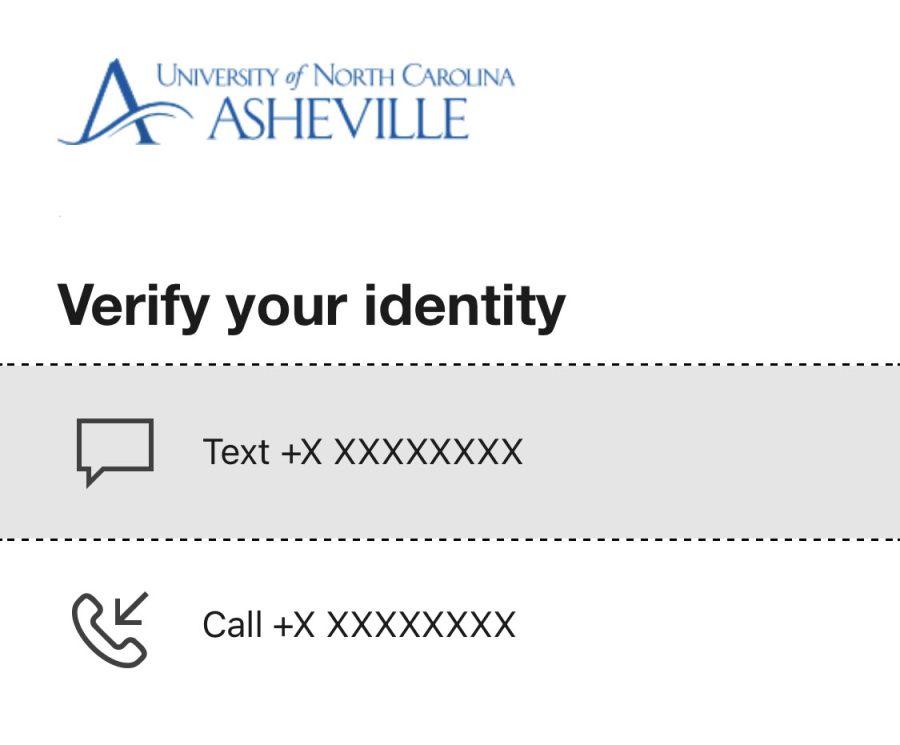Dual verification met with dual reactions from students and staff
UNC Asheville student and faculty have become familiar with this new screen every login this semester.
April 27, 2023
If you go to UNC Asheville you might notice something new this semester when you sign into Moodle or OnePort. Although your password may be saved after logging in, you are faced with an option: To receive a code via text or call or use your dual verification app.
Although the immediate implication is security, students have certainly felt strongly about the change.
“I mean I see the idea but I think you should increase backend cyber security before forcing it on us just to annoy the shit out of us,” said UNCA senior Bobby Cagle.
It is not just students faced with the change as all faculty are also required to use dual verification.
“The day we had to adopt it was a little bit rough but once I’ve gotten used to it it’s no big deal.
I appreciate people trying to keep us safe online,” Jason Wingert, professor of Health & Wellness at UNCA said.
But what’s the official behind the scenes reasoning behind the dual verification push and how will the university plan on streamlining it in the future?
That answer can be found at the IT Help Center located on campus at the Ramsey Library where Gabe Carswell works, an engineering major and IT employee.
“The main reason why dual verification is smart to have is in an age where everyone is online, having an account that is super secure is important,” Carswell said. “As well as ease of use because most of the time you can make it so you don’t even have to use a password instead you use biometrics like face ID and fingerprints.”
Although a supporter of the initiative, Carswell can agree it can be frustrating at times.
“Yeah it can be a little annoying don’t get me wrong, but our department is here to get all the kinks out,” he said.
As for those kinks, the IT department receives many calls and emails related to dual verification.
“‘Why do we have this’ Is the big question we get. People are mad they have to use it. A lot of older people on campus don’t really see the point in it but a lot of the student population has been like ‘okay yeah we kind of need this’,” Carswell said.
The main issue in setting it up, according to Carswell, became an issue immediately, as it was introduced after spring break.
“Right when housing was needed everyone signed up for their rooms and no one could get into OnePort. So we are getting calls like ‘oh I’m going to lose my room’ and I’m like don’t worry no one can get in so you’re not going to lose anything,” Carswell said.
But now that we are wrapping up the semester, dual verification seems to be in a better place.
“At this point we’re chilling,” Carswell said. “There’s a few calls a day right now but once we get all the kinks worked out because there was a lot of stuff people were messing up. We had to get our guides right so once we get it working out probably next semester you’ll only have to do it once a week.”
He explained that the goal was to extend the “Remind me in 1-day” option, which is only temporary and acts as a test run for the entire program.
“The main reason for the ‘Remind me in 1-day’ option is we need as much initial traffic through it as possible. We’re just beta testing the whole campus right now,” Carswell said.
The university’s eventual goal is if you sign in within another 24 hour period it extends it.
“So pretty much it keeps adding up until you’re not on it for 48 hours then it will make you do it again,” Carswell said.
The idea is to make the final product convenient and easy and well as safe and secure.
“If you’re waking up everyday at eight in the morning and going to school it’ll be like you don’t have to use dual verification. Next semester it’s going to be super easy. We are going to extend it over the summer,” Carswell said.


















